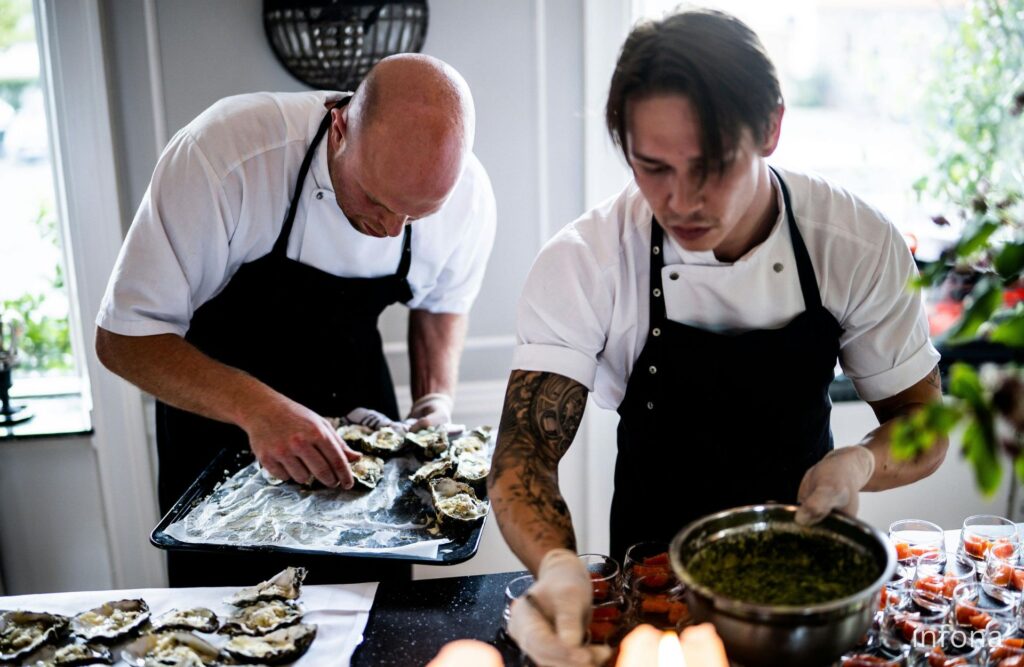In the high-speed environment of the foodservice industry, line cooks are responsible for insuring that each meal served is up to the standards of the restaurant’s quality and presentation. The work of a line cook is demanding, with both technical culinary expertise and pressure management. This article offers an insightful overview of the job description of a line cook, their responsibilities, needed skills, and how one becomes a professional line cook.

What is a Line Cook?
A line cook, also at times called a station cook, is a trained cook who has a job working in the kitchen, usually along the “line” where cooking occurs and the food is ordered up. Line cooks are used to perform the actual cooking of foods, tending to share tasks with a group of cooks, prep cooks, and the other kitchen crew. The job of a line cook differs slightly from the size and type of restaurant, but typically it entails a high level of food preparation standards, cleanliness, and organization.
Key Responsibilities of a Line Cook
The line cook’s tasks may differ depending on the business, but some responsibilities are uniform across the board. The following are the most typical tasks executed by a line cook:
1. Cooking and Food Preparation
Among the foremost duties of a line cook is preparing food to order. This entails grilling, sautéing, frying, broiling, or preparing food as per recipes and restaurant criteria. Line cooks need to be skilled in operating kitchen equipment such as grills, fryers, stovetops, ovens, and other culinary equipment to prepare high-quality meals in a timely manner.
2. Presentation of Food
Line cooks need to be mindful of the visual appeal of dishes. Whether plating food for a fine dining restaurant or building burgers at a fast-casual restaurant, how food looks contributes significantly to the satisfaction of the customer. Whether plating at a fine dining restaurant or stacking burgers at a fast-casual restaurant, the presentation of food is what ensures that the restaurant’s standard is achieved by each dish.
3. Cleanliness Maintenance
A hygienic kitchen is essential for food safety, and line cooks must ensure their work areas are kept clean during their shifts. This involves sanitizing cooking tops, utensils, and equipment after every use and making sure the kitchen meets sanitation and health safety standards.
4. Controlling Food Stocks
Line cooks usually check the stock of ingredients utilized within their section. They might have to alert kitchen managers or chefs when supplies of certain ingredients run low or if products need replenishment. Controlling food stock prevents wastage and keeps the kitchen in running order.
5. Working Together with Other Kitchen Staff
In a typical kitchen, teamwork is essential to guarantee that food is prepared efficiently and properly. Line cooks work closely with other cooks, prep cooks, dishwashers, and servers to provide meals in a timely manner and with accuracy. Good communication and collaboration with other kitchen staff are key to a smooth kitchen operation.
6. Following Recipes and Portioning
Consistency is the name of the game in every kitchen, and line cooks have to execute recipes to the letter. This means not only cooking the food as directed but also maintaining the correct portion sizes. Sticking to portion control measures assists with cost control and ensures that customers get the proper amount of food.
7. Maintaining Food Safety and Quality Control
Line cooks have the responsibility of ensuring food safety guidelines by holding ingredients at the required temperature and using safe food handling procedures. They are also required to ensure food is cooked to the right internal temperature to avoid foodborne disease and adherence to health codes.
Skills and Qualifications Needed to be a Line Cook
A successful line cook has a mix of technical cooking skills and personal qualities that allow them to excel in the high-pressure atmosphere of a kitchen. The following are the main skills and qualifications that line cooks must possess:
1. Culinary Expertise
Line Cook Job Description need to have a good command of cooking methods and kitchen procedures. Familiarity with the different methods of cooking, including grilling, sautéing, and baking, is important. Line cooks may also specialize in certain stations, depending on the restaurant, such as the grill station or the sauté station.
2. Knife Skills
One of the most basic skills a line cook must have is how to use knives effectively and safely. Knife skills are essential in chopping vegetables, filleting fish, and other food preparation tasks. A well-trained line cook understands how to use knives with accuracy, which reduces prep time and enhances safety in the kitchen.
3. Time Management and Multitasking
Work in a kitchen usually involves juggling many tasks at once. Line cooks must be able to prioritize and multitask in order to get various dishes ready at the appropriate time without sacrificing quality. Effective time management also translates to knowing the timing of a busy kitchen and remaining calm under stressful conditions.
4. Attention to Detail
Line cooks require an observant eye, from making certain that food is cooked to an adequate doneness to making sure that each plate looks good. Attention to detail is also carried over to recipe adherence, ingredient measurement, and maintaining consistency among all dishes.
5. Physical Stamina and Endurance
Cooking in a hectic kitchen can be strenuous. Line cooks spend most of their time on their feet and need to be capable of lifting heavy pots, pans, and ingredients. Stamina is required to sustain the rapid pace and long hours common in the kitchen setting.
6. Communication Skills
Effective and concise communication is responsible for keeping the kitchen efficient. Line cooks must communicate well with chefs, other cooks, and kitchen personnel so that orders can be prepared accurately and on time. Effective communication also minimizes errors and enhances the general movement of the kitchen.
Education and Training for Line Cooks
Although formal education is not always necessary to become a line cook, there are a number of ways to acquire the skills and knowledge needed. Most line cooks begin in entry-level kitchen jobs and receive on-the-job training, learning about cooking methods, kitchen operations, and food safety while on the job.
However, for those who want a more structured path, they can enroll in culinary schools or cooking courses. A structured culinary education equips one with extensive knowledge of culinary arts, food safety, and kitchen management, which can enhance a line cook’s competitiveness in the labor market.
The Career Path of a Line Cook
Becoming a line cook can be the stepping stone to a successful culinary career. Most line cooks begin at the entry level and work their way up to more advanced positions in the kitchen over time. Eventually, they can move into roles such as:
-
Sous Chef: A sous chef is an advanced kitchen role that is in charge of managing the day-to-day activities of the kitchen.
-
Chef de Partie: A station chef, or chef de partie, is responsible for a station in the kitchen, i.e., the grill or pastry area.
-
Head Chef: The head chef, or executive chef, is the head of the kitchen, overseeing menu planning, food preparation, and management of the kitchen staff.
Acquiring experience and enhancing kitchen skills is what can help propel someone forward in the culinary arts. Moreover, several line cooks also specialize in particular cuisines or techniques, which can provide avenues to greater paying jobs or novel opportunities.
Conclusion
The position of a Line Cook Job Description is instrumental to the seamless functioning of any restaurant kitchen. With their capability to perform orders quickly and accurately, line cooks make sure that customers are served high-quality, well-prepared food every time. This job requires a special combination of technical expertise, creativity, and endurance. Those who perform well in the kitchen and have a passion for cooking can find plenty of opportunities for professional development in the culinary field.
Whether you wish to become a Line Cook Job Description or simply want to know more about the position, it’s apparent that line cooks are a crucial component of the foodservice business. Their knowledge and labor may be behind the scenes, but their influence on the dining experience is undeniable.

